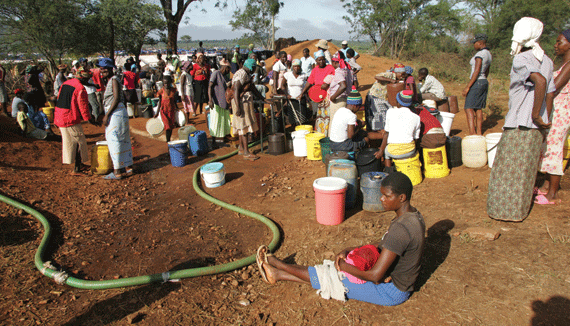
A STRONG stench of human waste pervades Chingwizi Camp in the Nuanetsi Ranch in Masvingo province where thousands of Tokwe-Mukosi Dam flood victims have been resettled while awaiting allocation of plots by the government.
TATENDA CHITAGU OWN CORRESPONDENT
Crammed in donated tents, the people from Chivi and Masvingo South where the dam flood basin lies try to face their new lives bravely, but the hustle and bustle cannot hide the present abnormal circumstances they find themselves in.
Men and women troop to the bush to look for firewood, take a bath or relieve themselves.
The villagers are shunning the few available toilets as they are dirty and unusable. There are no social amenities, no clean and safe running water.
Clearly, there are no rules — the laws of the jungle take precedence and it is purely survival of the fittest.
“Literally, it is a jungle out here. We bath in the open and some men actually peep at you as you take a bath. They also bath in the bush as well,” one of the camp’s residents Esnath Muzenda (54) said.
“We meet there bathing and they do not care; it is now normal here. The toilets are few and overwhelmed and are very filthy and unhealthy. We use the bush as our toilet. There is no privacy here,” she said.
- Chamisa under fire over US$120K donation
- Mavhunga puts DeMbare into Chibuku quarterfinals
- Pension funds bet on Cabora Bassa oilfields
- Councils defy govt fire tender directive
Keep Reading
Muzenda, originally from the Gunikuni area in Village 11B, was evacuated by a helicopter after the floods swallowed her homestead and left her marooned.
Their homesteads were flattened by massive waves of water from the flooded partially completed Tokwe-Mukosi Dam after consecutive days of heavy rains.
Muzenda said she has had to endure the burden of pitching tents and looking for poles because her only son was still at Gunikuni transit camp with their five cattle awaiting transportation to Chingwizi.
She was moved to Chingwizi Camp with her daughter-in-law and five young grandchildren.
“I have to do everything by myself . . . no one can come and help me. I have to pitch the tent before dusk or else I will sleep in the open and get pounded by the rains like what happened on the day I came.
“There were no tents, so we slept in the open and my grandchildren all contracted flu. They are still unwell as I speak.
“We are living like rats here. The place is overcrowded and the next tent is less than a metre away. It is like we are in a refugee camp,” Muzenda said.
As with most disasters, children are bearing the brunt of the Tokwe-Mukosi floods.
Muzenda said her young grandchildren could not walk to the new makeshift primary school erected about 6km away from the camp.
“They do not even know where the school is . . . it’s very far and there are just poles and a tent. The last time there was only one teacher to cater for all the pupils as others do not want to work here,” she said.
There are 910 school-going children in the camp — both primary and secondary.
Runhindi Mazhazhate (40) from Chihuku village under Chief Nyajena said she lost all her property to the floods and feared a severe disease outbreak in the camp.
“We are overcrowded here and diseases are likely to break out. There is no clean safe water and we appeal to the government to quickly allocate us plots so that we can live freely. We cannot cook when it is raining and our kids sometimes go to bed hungry,” Mazhazhate said.
She said although food aid was trickling in, they were now condemned to the same diet of sadza/isitshwala and kapenta (matemba) daily.
She said most villagers want to be self-reliant and start growing vegetables in gardens.
“Our crops were at tussling stage; we could have harvested enough, but the floods wreaked havoc.
“While we are given food handouts every day, we are limited to the same diet. We don’t want to have food thrown at us like chickens,” she said.
Because of the confusion caused by the overcrowding, Mazhazhate said she had lost her goat and suspected it was stolen.
Other flood victims narrated similar tales of how their lives had become a nightmare.
To them, the Tokwe-Mukosi Dam project has brought with it curses although it is meant to benefit people in the long run.
An octogenarian Enoch Chipfuwa (80) from Sekenya village under Chief Shumba, who came to the camp on February 17, said life was unbearable for him considering that he had to sleep in a tent compared to his five bed-roomed house, which stood out in the village.
The old man also has to prepare food for himself as his wife and grandchildren sought refuge with a relative in Masvingo town.
“My son-in-law saw the situation and realised that they could not stay here, so he took them in. I had to come for documentation processing for us to be allocated a plot,” Chipfuwa said.
“It pains me a lot to do the cooking and washing the dishes alone at my age. It also pains me to see that all I had worked for was swept away by the floods. Now I don’t see the reason for living anymore when I am left with nothing,” he said.
Although the Constitution guarantees people’s educational rights and access to basic health care, these villagers have none of that at the camps they have been moved to.
The situation is even worse for women. They said they were given donated sanitary wear, but it was inadequate.
Virginia Gandoweri said a nurse at the camp clinic advised her not to deliver there because they were afraid of complications as it was her first pregnancy.
“They told me that they were afraid of complications as there may be need for an operation so I have to go to a bigger hospital,” Gandoweri said.
Several Cabinet ministers, including Vice-President Joice Mujuru flew in to assess the situation and to calm the villagers.
Defence minister Sydney Sekeramayi admitted that the government had been caught off-guard.
“We were expecting a slow increase of water in the dam. We wanted to move people slowly over a period of time; however, we had to move them now as there was no time.
“We know it has not been easy, but the case is now a matter of life and death so we chose the former, even though you face difficulties. We know you were living somewhere, but be brave and accept it,” Sekeramayi told the villagers during a recent visit.
Mujuru said the villagers would in the end benefit from irrigation projects, giving the analogy of a pregnancy whereby a mother has to go into labour, but rejoices upon conceiving.
Lands and Rural Resettlement minister Douglas Mombeshora said the government had started demarcating and pegging about 60 000 hectares at Nuanetsi Ranch for the resettlement of families.
He said the pegging would be completed by April and a total of $320 000 was required for the task.
“We are looking at between 56 000 to 60 000 hectares that will be pegged and demarcated by our teams in preparation for the construction of permanent homes and other facilities for the Tokwe-Mukosi families,” Mombeshora said.
He said teams at Nuanetsi included officials from his Local Government, Public Works and National Housing ministry as well as Agriculture, Mechanisation and Irrigation Development ministries.
“We want to ease overcrowding that is obtaining at Chingwizi holding camp as soon as possible. There will be over 16 000 people in the camp when all families are relocated so we want to move with speed to develop their permanent plots,” he said.
But before that, the flood victims will continue to live in misery, a fate that became theirs by living in the vicinity of the massive dam project.










